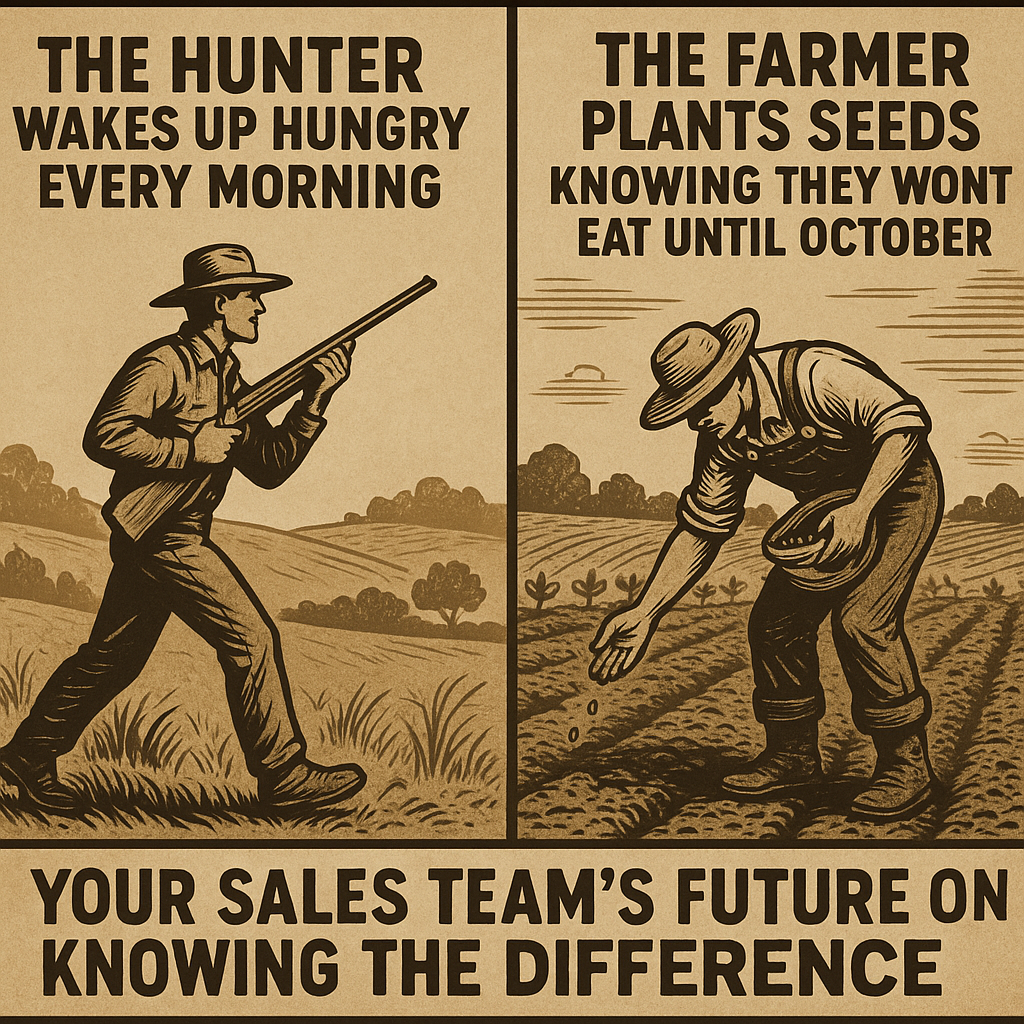The hunter wakes up hungry every morning.
Empty handed. Starting from zero. Again.
Yesterday's kill feeds no one today. The celebration was brief, the commission check spent, the gong rung and forgotten. The leaderboard reset at midnight, because that's what leaderboards do.
So they hunt.
They hunt with urgency, with scripts polished like weapons, with closing techniques passed down from sales manager to sales manager like ancient tribal knowledge. They hunt in packs or alone, in territories carved up by zip codes and verticals, pursuing prey that grows increasingly wary, increasingly sophisticated, increasingly tired of being hunted.
The hunter's math is simple: More calls equal more meetings. More meetings equal more proposals. More proposals equal more deals. More deals equal survival. Until tomorrow, when the math starts over.
But here's the thing about hunting—it's exhausting. For everyone.
The Farmer's Different Dream
The farmer plants seeds in April knowing they won't eat until October.
This is not delayed gratification. This is a fundamentally different relationship with time, with success, with the very nature of work itself.
Where the hunter sees a prospect, the farmer sees soil. Where the hunter sees a target, the farmer sees potential. Where the hunter asks "How quickly can I close this?" the farmer asks "What could grow here?"
The farmer knows something the hunter struggles to believe: The best customers aren't caught. They're cultivated.
Why the Transition Feels Impossible
You can't tell a hunter to become a farmer.
You might as well tell a shark to become a gardener.
The hunger is real. The quarterly pressure is real. The stack-ranked sales team is real. The territory plan is real. The commission structure that pays for the kids' college is real.
And so we end up with hunters wearing farmer costumes, talking about "relationships" while gripping their closing techniques like concealed weapons, speaking of "customer success" while calculating commission splits.
The costume doesn't fit because the stage is wrong.
The Metrics Make the Culture
Here's what most sales leaders get backward: They try to change behavior before changing the scoreboard.
But hunters hunt because we count kills. They close because we celebrate closes. They think in quarters because we measure in quarters.
What if we measured differently?
What if the leaderboard showed:
- Customer lifetime value created, not deals closed
- Relationship depth, not contact count
- Problems solved, not products sold
- References generated, not referrals requested
- Expansion revenue, not new logos
- Time to value, not time to close
The hunter reads this list and feels confused. The farmer reads it and feels recognized.
The Dangerous Middle
The most dangerous place is halfway between hunting and farming.
It's the sales team that talks about farming but pays for hunting. It's the organization that preaches relationships but practices transactions. It's the leader who says "customer success" but means "customer acquisition."
Stop here. Read that last line again.
"Customer success" has become our most abused phrase. We've weaponized it into a hunting tool. We say "customer success" in the meeting, but the commission check only clears when we acquire, not when they succeed. We have "Customer Success Managers" who've never met a customer after day 60. We have "Customer Success Departments" measured on logo retention, not on whether those logos are actually succeeding.
The customer knows the difference. They can smell the hunter dressed in farmer's clothing from the first discovery call. They hear "partnership" but feel the crosshairs. They're promised cultivation but experience extraction.
This middle ground isn't a transition. It's a contradiction. And contradictions create cynics.
Your best hunters will leave because the rules became unclear. Your natural farmers will leave because the culture still rewards the hunt. And you'll be left with those who are neither good hunters nor good farmers—just confused participants in a game where no one knows the score.
Start With One Field
You cannot transform a hunting ground into farmland overnight.
Start with one field. One segment. One product line. One small team of people who already think like farmers, who've been suffering in silence in your hunter culture, who light up when you talk about customer lifetime value and go quiet when someone rings the gong.
Give them different metrics. Completely different. Metrics that would make a hunter laugh and a farmer nod.
Pay them for depth, not breadth. Pay them for retention, not acquisition. Pay them for the second year, not the first signature.
Then watch what grows.
The Choice
Some of your hunters will watch this experiment and see the future. They'll start asking different questions, having different conversations, thinking in different timeframes. These are your convertible hunters—rare and valuable.
Most of your hunters will watch and wait. They'll hedge. They'll try to play both games. They'll fail at both.
And some will leave. Let them. They'll find hunting grounds elsewhere, and that's exactly as it should be. Hunters aren't wrong. They're just hunting.
But here's what happens when the farming starts to work:
The customers stay longer. They buy more. They trust more. They refer without being asked. They become partners, not prey.
The farmers wake up to emails from happy customers, not cold call lists. They solve interesting problems, not objection scripts. They build something that compounds, not something that resets.
The Real Question
The question isn't whether your sales team should transition from hunters to farmers.
The question is whether you're brave enough to change what you measure.
Because the moment you change the metrics, the game changes. The moment the game changes, the players change. The moment the players change, the culture changes.
And culture, as they say, eats strategy for breakfast.
Even when the strategy is to stop eating what you kill and start growing what you keep.
The transition from hunting to farming isn't about training. It's about choosing. Choose your metrics carefully. They're choosing your future.


